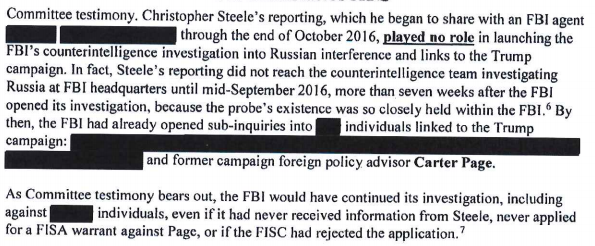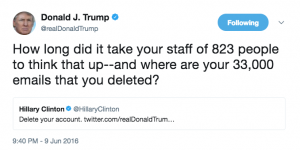About the Oleg Deripaska Reference in the Mueller Memo
As I promised in my general summary of the Mueller memo and my assertion that there are more memos from DAG Rosenstein authorizing expanded scope on Mueller’s investigation, I want to comment on the reference to Oleg Deripaska in the memo.
The memo, remember, ostensibly only needs to lay out how Mueller’s appointment “to investigate Russian interference with the 2016 presidential election and related matters” authorizes him to prosecute a bunch of money laundering used to hide the fact that Paul Manafort was lobbying for the interests of the Party of Regions, the Russian backed effort to keep its favored oligarchs in power in Ukraine, when he was pretending to represent an independent entity.
But at the end of a long paragraph explaining how Rosenstein’s appointment order alone would justify that prosecution — because Manafort played a key role in Trump’s campaign, and because Manafort resigned after his extensive ties to Yanukovych were exposed — Mueller drops in a reference to “open source reporting” tying Manafort to Deripaska.
The Appointment Order itself readily encompasses Manafort’s charged conduct. First, his conduct falls within the scope of paragraph (b)(i) of the Appointment Order, which authorizes investigation of “any links and/or coordination between the Russian government and individuals associated with the campaign of President Donald Trump.” The basis for coverage of Manafort’s crimes under that authority is readily apparent. Manafort joined the Trump campaign as convention manager in March 2016 and served as campaign chairman from May 2016 until his resignation in August 2016, after reports surfaced of his financial activities in Ukraine. He thus constituted an “individual associated with the campaign of President Donald Trump.” Appointment Order ¶ (b) and (b)(i). He was, in addition, an individual with long ties to a Russia-backed Ukrainian politician. See Indictment, Doc. 202, ¶¶ 1-6, 9 (noting that between 2006 and 2015, Manafort acted as an unregistered agent of Ukraine, its former President, Victor Yanukovych—who fled to Russia after popular protests—and Yanukovych’s political party). Open-source reporting also has described business arrangements between Manafort and “a Russian oligarch, Oleg Deripaska, a close ally of President Vladimir V. Putin.”8 [my emphasis]
There’s no explicit reference to Deripaska in Manafort’s indictment. The only public references to him in the Manafort prosecution I’m aware of are instead to Deripaska’s crony, Konstantin Kilimnik, laying out his efforts to spin the indictment in an op-ed in the Kyiv Post, which Mueller’s prosecutors argued was an attempt to skirt the gag rule in the case. There’s admittedly more detailed reference to Kilimnik — referred to as Person A — in the same team’s sentencing memo for Alex Van der Zwaan, including the assertion that,
[T]he lies and withholding of documents were material to the Special Counsel’s Office’s investigation. That Gates and Person A were directly communicating in September and October 2016 was pertinent to the investigation. Federal Bureau of Investigation Special Agents assisting the Special Counsel’s Office assess that Person A has ties to a Russian intelligence service and had such ties in 2016. During his first interview with the Special Counsel’s Office, van der Zwaan admitted that he knew of that connection, stating that Gates told him Person A was a former Russian Intelligence Officer with the GRU.2
2 Person A worked with Manafort and Gates in connection with their Ukraine lobbying work. Person A is a foreign national and was a close business colleague of Manafort and Gates. He worked in Ukraine at Manafort’s company Davis Manafort International, LLC (DMI). Up until mid-August 2016, Person A lived in Kiev and Moscow
But thus far, nothing specifically relating to Deripaska or Kilimnik has been charged, even while a different open source report describing Manafort’s offer to give private briefings to Deripaska via Kilimnik laid out a much closer tie between Deripaska and election tampering, and another open source report described FBI scrutiny of Kilimnik’s role in changing the GOP platform.
As noted, instead of referencing those more damning open source reports, Mueller instead points to the August 15, 2016 NYT article that precipitated Manafort’s resignation from the Trump campaign. The report, sourced to investigators in “Ukraine’s newly formed National Anti-Corruption Bureau” laid out the secret ledgers showing that Manafort may have received $12.7 million in off-the-book payments for his consulting services that tampered with Ukraine’s electoral process.
The report goes on to lay out the general logic of the money laundering prosecution at issue — how Manafort’s money laundering prevented others from understanding how much he actually made for his services to Yanukovych and the Party of Regions.
Mr. Manafort never registered as a foreign agent with the United States Justice Department — as required of those seeking to influence American policy on behalf of foreign clients — although one of his subcontractors did.
It is unclear if Mr. Manafort’s activities necessitated registering. If they were limited to advising the Party of Regions in Ukraine, he probably would not have had to. But he also worked to burnish his client’s image in the West and helped Mr. Yanukovych’s administration draft a report defending its prosecution of his chief rival, Yulia V. Tymoshenko, in 2012.
Whatever the case, absent a registration — which requires disclosure of how much the registrant is being paid and by whom — Mr. Manafort’s compensation has remained a mystery.
From there, it turns to the Pericles Open Market fund that Manafort, Gates, and others got Deripaska to fund. The story doesn’t describe any direct tie between the secret ledgers at issue in the story and the Deripaska investments. Rather,the Deripaska lawsuit against Manafort made details of the fund available to Ukraine’s special prosecutor, who cited them as an example of how Yanukovych’s cronies laundered money.
In a recent interview, Serhiy V. Gorbatyuk, Ukraine’s special prosecutor for high-level corruption cases, pointed to an open file on his desk containing paperwork for one of the shell companies, Milltown Corporate Services Ltd., which played a central role in the state’s purchase of two oil derricks for $785 million, or about double what they were said to be worth.
“This,” he said, “was an offshore used often by Mr. Yanukovych’s entourage.”
[snip]
Mr. Deripaska agreed to commit as much as $100 million to Pericles so it could buy assets in Ukraine and Eastern Europe, including a regional cable television and communications company called Black Sea Cable. But corporate records and court filings show that it was hardly a straightforward transaction.
The Black Sea Cable assets were controlled by a rotating cast of offshore companies that led back to the Yanukovych network, including, at various times, Milltown Corporate Services and two other companies well known to law enforcement officials, Monohold A.G. and Intrahold A.G. Those two companies won inflated contracts with a state-run agricultural company, and also acquired a business center in Kiev with a helicopter pad on the roof that would ease Mr. Yanukovych’s commute from his country estate to the presidential offices.
The Deripaska reference in a memo describing why Mueller was authorized to prosecute Manafort for related (but not explicitly) money laundering would otherwise be a non-sequitur. Because it appears in an article that not only lays out the basis for the underlying charges, but does so in an article that had an impact on Manafort’s role in the campaign, it doesn’t seem so obviously tangential. Plus, it has the added benefit (unlike the open source reporting deriving from leaks from Congress or law enforcement) of being an on-the-record source from someone perfectly entitled to the talk to the press about Ukraine’s investigation into Manafort. This, then, was a legally permissible way to insert Deripaska into a filing where he otherwise might not have belonged.
Plus, that same open source report lays out that Ukraine’s National Anti-Corruption Bureau can’t prosecute suspects, but instead has to rely on entities like the FBI — with which it has an evidence sharing agreement — to do so.
The bureau, whose government funding is mandated under American and European Union aid programs and which has an evidence-sharing agreement with the F.B.I., has investigatory powers but cannot indict suspects. Only if it passes its findings to prosecutors — which has not happened with Mr. Manafort — does a subject of its inquiry become part of a criminal case.
During Jim Comey’s March 20, 2017 testimony (which is cited explicitly in the Mueller memo to lay out the initial unclassified scope of the investigation), Jim Himes tried to get the then FBI Director to admit that DOJ had not responded to seven requests for MLAT assistance to secure Manafort’s cooperation in their inquiry.
HIMES: And the reason I bring all this up with you is because the story also says and it appears to have been confirmed by the Department of Justice that the current Ukraine regime, hardly a friend of the Russians. And very much targeted by the Russians has made seven requests to the United States government’s — the United States government for assistance under the MLA treaty in securing the assistance of Paul Manafort as part of this on anti-corruption case. And in fact, the story says that you were presented personally with a letter asking for that assistance.
So my question Director Comey is, is that all true? Have you been asked to provide assistance to the current Ukrainian government with respect to Paul Manafort? And how do you intend to respond to that request?
COMEY: It’s not something I can comment on. I can say generally, we have a very strong relationship and cooperation in the criminal and national security areas with our Ukrainian partners, but I can’t talk about the particular matter.
Comey, while not confirming the report, instead suggested that the FBI continued to cooperate closely with Ukraine on this issue — a strong suggestion that Ukraine ultimately had asked an entity that could take prosecutorial action to do so.
To sum up thus far: this reference to Deripaska is, to the best of my knowledge, the first explicit reference to him anywhere in the Manafort docket. It has no obvious place in a memo explaining why Mueller is authorized to prosecute Manafort for money laundering tied to the Party of Regions. But there it is, in the middle of a paragraph explaining why Manafort’s prosecution follows logically even from the original grant of authority, to say nothing of any unredacted or redacted bullet points explicitly including Manafort’s alleged and documented ties to Deripaska in the scope of Mueller’s authority. By including it in the memo, Mueller effectively includes Deripaska in the ongoing discussions of the things Judge Amy Berman Jackson will likely soon agree Mueller has the authority to prosecute.
It is, then, the most telling line in the entire memo, and the most clever. It uses the opportunity of this memo to pre-authorize where Mueller is going, without having to reveal what evidence Mueller is sitting on to go there.
Of course, where he’s going — to this oligarch and his crony’s role in Trump’s election — is very obviously tied to the case in chief, the Russian tampering in the US election.
Update: Later today Mueller’s team requested permission to file one of the exhibits from their filing — which given Judge Berman Jackson’s description has to be the Rosenstein memo — under seal. Which suggests they want him to know what else he’s being investigated for, which is probably the Deripaska stuff.













